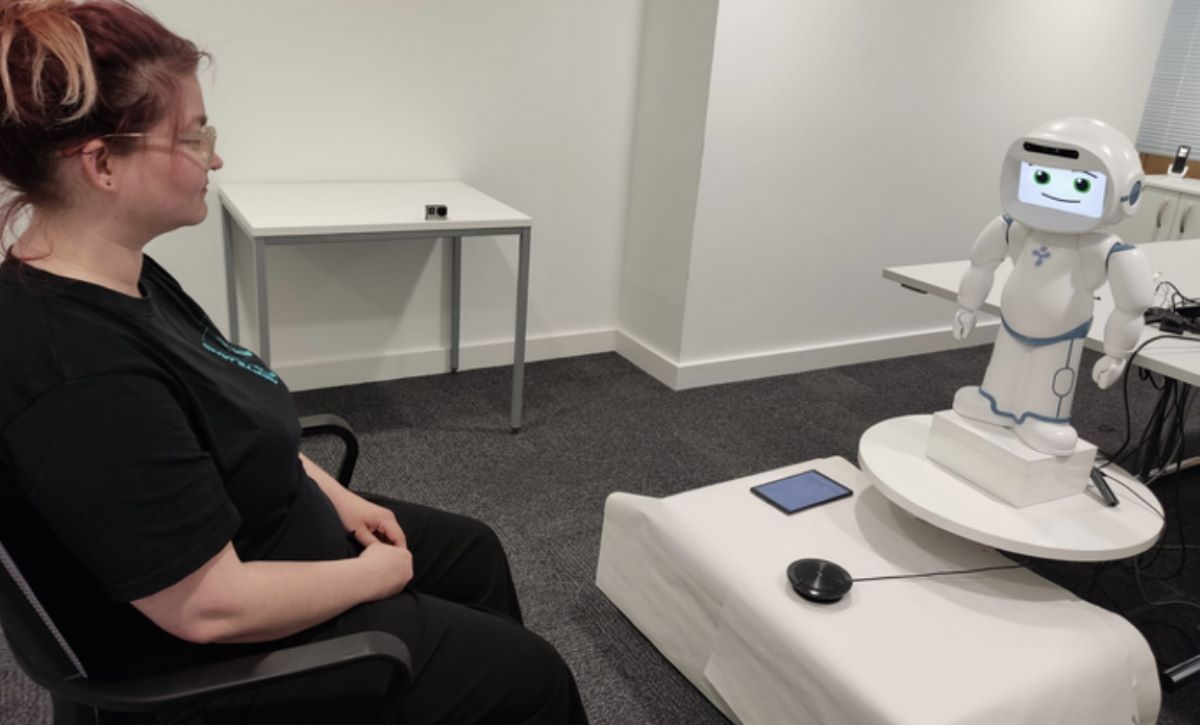The emergence of a robot could significantly affect how employees interact with it and its ability to improve emotional well-being at work.
A recent study from the University of Cambridge found that a toy-like robot called Misty II was better at promoting well-being in the workplace than a humanoid robot called QTRobot.
A study of robotics and well-being at work
Study methodology
The study was conducted in a technology consulting company with the participation of 26 employees. For four weeks, the participants attended weekly robot-led wellness sessions. Despite the fact that both robots have identical voices, facial expressions, and scripts, the staff showed a clear preference for Misty II due to his simpler, friendlier appearance.
Results
The results of the study indicated that the employees who participated in the wellness sessions with Misty II felt a greater connection with the bot than those who worked with the QTRobot. Misty II’s game-like appearance lowered expectations, allowing employees to more easily connect with the bot.
Implications for the design of health robots
The results of this study have important implications for the design of robots for use in work environments to improve emotional well-being. When considering the appearance of a bot, it is essential to consider how employees will perceive and relate to it. A friendly and less intimidating design can facilitate more communication and, ultimately, be more effective in promoting well-being in the workplace.
Interaction improvements
The research team is currently working on improving the robots’ response during training practices and interactions. training. Incorporating more advanced language models and improving interaction skills will allow bots to be more effective at providing emotional support and adapting to the individual needs of employees.
The future of robots in the workplace
Gradual adoption of technology
The gradual adoption of robotics and AI technologies in the workplace may allow companies to overcome resource and personnel barriers to implement emotional well-being programs. These bots have the potential to provide emotional support and reduce the workload of mental health professionals.
Customization and flexibility
As emotional wellness bots evolve, they are expected to be customized and adapted to the specific needs of each employee. Flexibility and personalization in providing emotional support are key to ensuring that employees feel comfortable and supported in their work environment.
Integration of robots into wellness programs
To ensure that emotional wellness bots are effective, it is critical that they are designed and programmed in collaboration with mental health professionals. By working with therapists and wellness experts, a robotic platform could be developed that adequately addresses the emotional and psychological needs of employees.
Once implemented in the workplace, it is imperative that emotional well-being bots be continuously evaluated and monitored. This will allow companies to adjust and improve their bot-based wellness programs as needed, ensuring that employees receive appropriate and effective emotional support.
Emotional wellness bots can offer many benefits to both employees and employers:
- Accessibility: Bots can be available to provide emotional support at any time, increasing the accessibility of support in the workplace.
- Reduce stigma: Using bots to address emotional well-being issues may reduce the stigma associated with seeking help for mental health issues.
- efficiency: Bots can be a cost-effective solution for providing emotional support, especially in companies with limited resources.
- protection: Early and regular emotional support can help prevent long-term mental health problems and improve employees’ quality of life.
Challenges and ethical considerations
As emotional wellness bots become more common in the workplace, there is also a need to address challenges and ethical considerations that may arise. These include issues of privacy and confidentiality, the potential for developing overly emotional relationships with bots, and the importance of ensuring that employees are not replaced by bots in emotional support.
By addressing these challenges and ensuring that ethical considerations are addressed appropriately, emotional wellness bots have the potential to change and improve the way companies approach the mental health and well-being of their employees.
More info at eurekalert.org

“Social media evangelist. Student. Reader. Troublemaker. Typical introvert.”

:quality(85)/cloudfront-us-east-1.images.arcpublishing.com/infobae/TEQF6EONZRFGLLLDIDD4L2O4EE.jpg)

:quality(75)/cloudfront-us-east-1.images.arcpublishing.com/elcomercio/XU32LRAEZFDDPNVHLFU3CKVBYY.jpg)



More Stories
Venezuela ranks fourth in female leadership in science and technology in Latin America
In Portuguesa and Sucre they explore the wonderful world of science
The university court overturns the expulsion of two teachers and a chemical sciences student